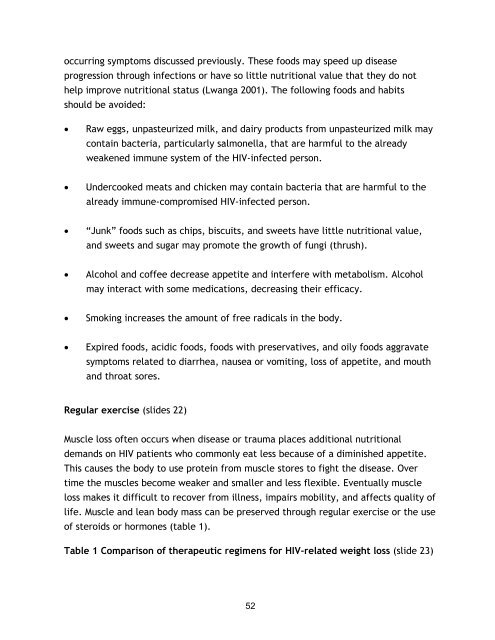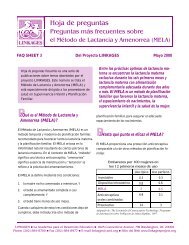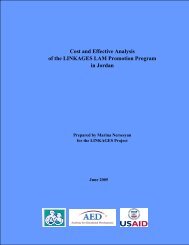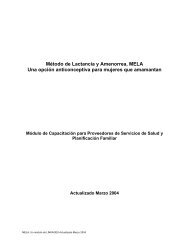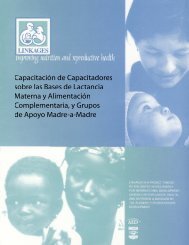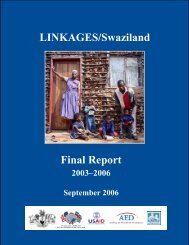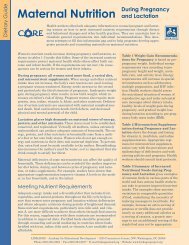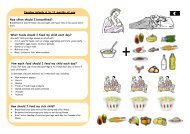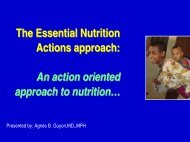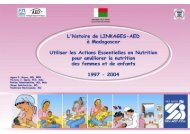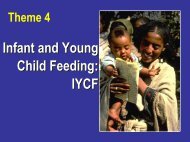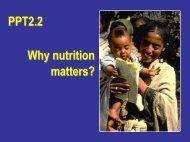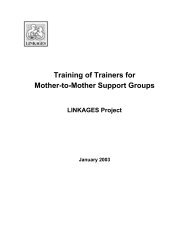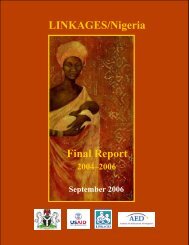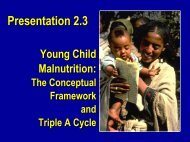- Page 1 and 2:
Regional Centrefor Quality ofHealth
- Page 3 and 4:
ACKNOWLEDGMENTSThis training manual
- Page 5 and 6:
ABBREVIATIONS AND ACRONYMSACCAIDSAN
- Page 7 and 8:
INTRODUCTIONThe coexistence of high
- Page 9 and 10:
ContentThe content is arranged in t
- Page 11 and 12: The sessions can also be taught in
- Page 13: OutlineContent Methodology TimingDe
- Page 16 and 17: LECTURE NOTES 1: THE BASICS OF HIV/
- Page 18 and 19: gradually weakened. The infected pe
- Page 20 and 21: increase in HIV prevalence of 60 pe
- Page 22 and 23: infection may have a rapid onset, l
- Page 24 and 25: • Dot-blot immunobinding assayUri
- Page 26 and 27: • Removal of children from school
- Page 28 and 29: effectively, care and support inter
- Page 31 and 32: DISCUSSION POINTS 1================
- Page 34 and 35: Recommended preparation1. Be famili
- Page 36 and 37: LECTURE NOTES 2: LINK BETWEEN NUTRI
- Page 38 and 39: AIDS, the impairment of immune func
- Page 40 and 41: for healthy, non-HIV-infected peopl
- Page 42 and 43: Low blood levels of several nutrien
- Page 44 and 45: • Finally, a study of AIDS patien
- Page 46 and 47: EXERCISE 2=========================
- Page 48 and 49: SESSION 3 NUTRITION ACTIONS FOR PEO
- Page 50 and 51: Required materials• LCD or overhe
- Page 52 and 53: McDermott, AY, A Shevitz, T Knox, R
- Page 54 and 55: Goals of nutritional care and suppo
- Page 56 and 57: • Circumferences of the waist, hi
- Page 58 and 59: Consider the phase of the HIV infec
- Page 60 and 61: Promote adequate nutrient intake (s
- Page 64 and 65: TherapyNitrogenretention[g/day]Rate
- Page 66 and 67: Nutrient supplements for people liv
- Page 68 and 69: Conclusion (slide 31)Nutritional ca
- Page 70 and 71: HANDOUT 3.1 Case studies in HIV and
- Page 72 and 73: HANDOUT 3.2 Safe Food Handling Prac
- Page 74 and 75: OutlineContent Methodology Timing1.
- Page 76 and 77: Recommended preparation• Be famil
- Page 78 and 79: PVO-USAID Steering Committee on Mul
- Page 80 and 81: Nutritional care and support of peo
- Page 82 and 83: In this session “food security co
- Page 84 and 85: HIV/AIDS attacks food security not
- Page 86 and 87: • Human capital: Reduced producti
- Page 88 and 89: Food-insecure populations may also
- Page 90 and 91: Food security constraints to nutrit
- Page 92 and 93: Pregnant and lactating women (slide
- Page 94 and 95: Implementation of nutritional care
- Page 96 and 97: demand these foods. A good assessme
- Page 98 and 99: Counselors should be aware of and i
- Page 100 and 101: Conclusion (slide 36)The capacity t
- Page 102 and 103: UNAIDS and WHO. 2002. AIDS epidemic
- Page 104 and 105: 1. How does poor food availability
- Page 106 and 107: 5. Will referrals and targeting of
- Page 108 and 109: SESSION 5 NUTRITIONAL MANAGEMENT OF
- Page 110 and 111: Required materials• LCD or overhe
- Page 112 and 113:
LECTURE NOTES 5: NUTRITIONAL MANAGE
- Page 114 and 115:
Figure 2 Cycle of malnutrition and
- Page 116 and 117:
IV. Late symptomatic phase (full-bl
- Page 118 and 119:
The following symptoms may also neg
- Page 120 and 121:
• Enables greater food intake by
- Page 122 and 123:
EXERCISE 5=========================
- Page 124 and 125:
HANDOUT 5.1 Caring for symptoms ass
- Page 126 and 127:
Illness Diet Care and nutrition pra
- Page 128 and 129:
SESSION 6 NUTRITIONAL CARE AND SUPP
- Page 130 and 131:
OutlineContent Methodology Timing1.
- Page 132 and 133:
Recommended preparation• Be famil
- Page 134 and 135:
———. 1998. Randomised trial o
- Page 136 and 137:
LECTURE NOTES 6: NUTRITIONAL CARE A
- Page 138 and 139:
The stigma associated with HIV can
- Page 140 and 141:
of malnutrition, which increases th
- Page 142 and 143:
adolescent mother, growth and devel
- Page 144 and 145:
HIV infection increases the energy
- Page 146 and 147:
Anemia is common during HIV infecti
- Page 148 and 149:
The use of high levels of supplemen
- Page 150 and 151:
Nutritional care and support for th
- Page 152 and 153:
Management of secondary infections
- Page 154 and 155:
A. Nutrition history• Dietary int
- Page 156 and 157:
• Income, housing, amenities for
- Page 158 and 159:
multiple nutrient supplement, where
- Page 160 and 161:
Management of diet-related HIV prob
- Page 162 and 163:
Infant feeding options and risks (s
- Page 164 and 165:
insecurity and may increase malnutr
- Page 166 and 167:
Seumo-Fosso, E, and B Cogill. 2003.
- Page 168 and 169:
HANDOUT 6.1 Health Sector and Mater
- Page 170 and 171:
HANDOUT 6.2 A Guide to Nutritional
- Page 172 and 173:
• Educational levelLactating moth
- Page 174 and 175:
Did the counselor ask about: YES NO
- Page 176 and 177:
HANDOUT 6.4 Practical Consideration
- Page 178 and 179:
HANDOUT 6.5 Checklist for Nutrition
- Page 180 and 181:
HANDOUT 6.7 Dietary Management of C
- Page 182 and 183:
Dietary problemFeverNutritional int
- Page 184 and 185:
1. How could HIV infection affect R
- Page 186 and 187:
• Nutritional status, dietary int
- Page 188 and 189:
• Rita’s dietary intake and eat
- Page 190 and 191:
• Eating smaller, more frequent e
- Page 192 and 193:
• How was the nutritional assessm
- Page 194 and 195:
Estimated time: 120 minutes excludi
- Page 196 and 197:
Suggested reading materialsCoutsoud
- Page 198 and 199:
LECTURE NOTES 7: INFANT FEEDING AND
- Page 200 and 201:
• A viral, bacterial, or parasiti
- Page 202 and 203:
DNA (cell-associated virus) in colo
- Page 204 and 205:
Mucosal integrity (slide 18)Studies
- Page 206 and 207:
PMTCT interventions are most effect
- Page 208 and 209:
Breastfeeding techniquesIt is espec
- Page 210 and 211:
women with HIV/AIDS for additional
- Page 212 and 213:
• Providing skin-to-skin contact
- Page 214 and 215:
suitable for replacement feeds befo
- Page 216 and 217:
• Administration of ZVD and Lamiv
- Page 218 and 219:
Coutsoudis, A, et al. 2001. Are HIV
- Page 220 and 221:
Semba, RD, N Kumwenda, D Hoover, et
- Page 222 and 223:
Case study 1A school teacher, Regin
- Page 224 and 225:
• How would you respond to Hilary
- Page 226 and 227:
HANDOUT 7.2 PMTCT Decision-Making A
- Page 228 and 229:
OutlineContent Methodology Time1. E
- Page 230 and 231:
Suggested reading materialsAgostoni
- Page 232 and 233:
LECTURE NOTES 8: NUTRITION AND HIV/
- Page 234 and 235:
Despite these statistics, it is dif
- Page 236 and 237:
Etiology of growth failure among HI
- Page 238 and 239:
oys. Micronutrient deficiencies wil
- Page 240 and 241:
• Changes in eating behaviors ass
- Page 242 and 243:
• Address issues relevant and of
- Page 244 and 245:
Enhanced ARV therapy (slide 29)Chil
- Page 246 and 247:
• Refer children with severe maln
- Page 248 and 249:
DISCUSSION POINTS 8Questions for cl
- Page 250 and 251:
Action/activityNorman admitted to n
- Page 252 and 253:
OutlineContent Methodology Timing1.
- Page 254 and 255:
• Allocate time for each activity
- Page 256 and 257:
Food Medication Interactionswww.foo
- Page 258 and 259:
• Describes information collected
- Page 260 and 261:
• Antimalaria drugs such as quini
- Page 262 and 263:
Food effects on drug efficacy (slid
- Page 264 and 265:
Some antiretroviral drugs may affec
- Page 266 and 267:
MedicationPurposeRecommended Tobe t
- Page 268 and 269:
intake and poor nutrient absorption
- Page 270 and 271:
Anti-acid medications containing ma
- Page 272 and 273:
women’s nutritional status. It is
- Page 274 and 275:
Health provider capacityHealth prov
- Page 276 and 277:
• What foods should not be taken
- Page 278 and 279:
Gelato, M. 2003. Insulin and carboh
- Page 280 and 281:
eferred him to the counselor for th
- Page 282 and 283:
Medication Purpose Recommended Tobe
- Page 284 and 285:
Medication Purpose Recommended Tobe
- Page 286 and 287:
Side effects of each drug?Side effe
- Page 288 and 289:
PurposeTo provide basic information
- Page 290 and 291:
Factors in Transmissionand Vulnerab
- Page 292 and 293:
Impact on the Education Sector• D
- Page 294 and 295:
AcknowledgmentNutrition and HIV/AID
- Page 296 and 297:
Body Habitus ChangesMetabolic chang
- Page 298 and 299:
PurposeTo provide general nutrition
- Page 300 and 301:
Stages of HIV Disease andNutritionI
- Page 302 and 303:
IncreaseVitamin and Mineral IntakeS
- Page 304 and 305:
Lipodystrophy• Means fat maldistr
- Page 306 and 307:
PurposeTo introduce the constraints
- Page 308 and 309:
Effect of AIDS on Crop ProductionCr
- Page 310 and 311:
Pregnant and Lactating WomenFood an
- Page 312 and 313:
Session 5 Nutritional Management of
- Page 314 and 315:
Rationale, Cont.Importance of Manag
- Page 316 and 317:
Session 6 Nutritional Care and Supp
- Page 318 and 319:
Vulnerabilityof Women and Young Gir
- Page 320 and 321:
What Is Not KnownComparison of Nutr
- Page 322 and 323:
Purposeof Nutrition Care and Suppor
- Page 324 and 325:
Greatest Impact of NutritionImprove
- Page 326 and 327:
Size of the Problem in Africa• >3
- Page 328 and 329:
Possible Mechanisms ofTransmissionA
- Page 330 and 331:
Prevention-to-Care ContinuumInterve
- Page 332 and 333:
Session 8 Nutritional Care for Youn
- Page 334 and 335:
ChildrenBorn to HIV-Positive Mother
- Page 336 and 337:
Growth Failure Associated withIncre
- Page 338 and 339:
Enhanced ARV Therapy• To reduce v
- Page 340 and 341:
Care of the Terminally Ill ChildWhy
- Page 342 and 343:
PurposeTo provide knowledge and ski
- Page 344 and 345:
SIDE EFFECTS OF DRUGSaffectFOOD INT


